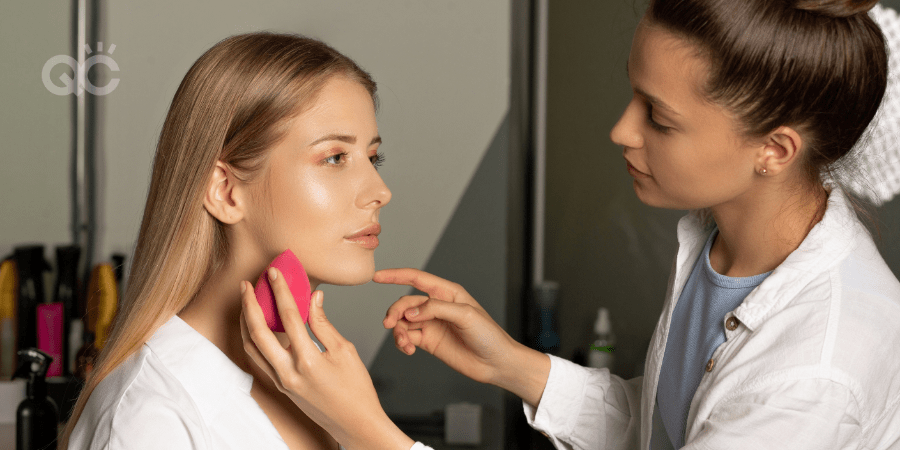Professional makeup artist courses offer vastly different training than what you’ll find in cosmetology school. Want to learn more? QC Makeup Academy‘s very own Student Ambassador, Angelica Hamlin, is here today to discuss why she chose to get makeup training – even though she’s already a licensed cosmetologist!
Why a Licensed Cosmetologist Chose to Enroll in QC’s Makeup Artist Courses
Angelica Hamlin is a student of QC’s Skincare Course. She is also a graduate of the Master Makeup Artistry and Virtual Makeup Training programs. Prior to enrolling with QC Makeup Academy, Angelica was first trained and licensed as a cosmetologist.
However, she found her cosmetology training to be rather limited when it came to makeup. It covered the basics, but not much else. Since Angelica wanted to add these services to her beauty business, she decided to enroll in makeup artist courses. This way, she could add to her existing qualifications and gain the extensive makeup knowledge she didn’t find in cosmetology school.
So, why did she choose to enroll with QC Makeup Academy? What specifically did she learn at QC that she didn’t learn before?
Watch the video below to find out!
Want to connect directly with Angelica? Join our Virtual Classroom on Facebook today!
Makeup Artist Courses vs. Cosmetology School
There are a few key difference between the type of training you’ll receive from makeup artist courses versus what’s taught in cosmetology school. Here’s a general breakdown of these differences:
Makeup Training
- Focuses specifically on makeup artistry
- Delves deeply into foundational techniques, theories, principles, and applications
- Offers extensive training into different areas of makeup (i.e. bridal, editorial, SFX, runway, film & television, etc.)
- Teaches hygiene and safety training
- Gives you the tools to launch/maintain a successful career as a makeup expert
- Provides a reputable makeup artistry certification or certificate upon completion
Cosmetology Training
- Required to teach specific curriculums that meet a regulated standard for cosmetologists
- Teaches a broader set of beauty-related skills, such as working with hair, nails, and skin
- As a result, a cosmetologist can offer certain beauty services that an MUA might not be able to
- However, training focuses less on makeup artistry (only tends to teach the basics)
- Provides a reputable cosmetology license upon completion
- Typically requires a written or practical test to be completed in order to obtain this license

Why You Should Enroll in QC’s Makeup Artist Courses
Cosmetology training is definitely beneficial. But makeup artist courses always the best way to go if you want to work as a professional MUA. So, here are just a handful of reasons why you should train QC Makeup Academy:
- QC’s tuition rates are highly competitive (less than the cost of cosmetology school)!
- Low monthly payment plans AND monthly promotions help lower the costs even more!
- QC Makeup Academy has an A+ ranking with the BBB!
- We’ve also been pioneering online learning since 1984!
- Our courses and certifications are internationally-recognized!
- Foundational, Specialty, and Advanced Courses offer training for makeup artists of ALL skill levels!
- Train from the comfort of your own home, at your own pace!
- Gain hands-on training through practical assignments!
- Receive regular feedback from your industry expert tutor!
- You’ll be able to connect and network with QC’s large community of peers and instructors!
- And SO much more!


What a great read! Well done. So excited for you to grow !
We’re incredibly proud of Angelica for her passion for continued learning, and are very happy to hear that you enjoyed this article, Cheri. Thanks so much for reading! xx
All the best,
The QC Team